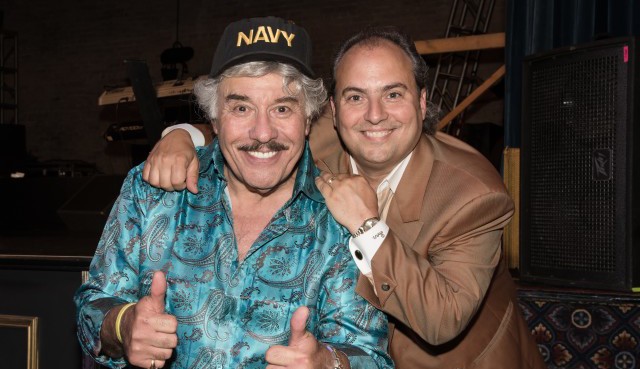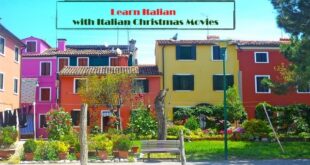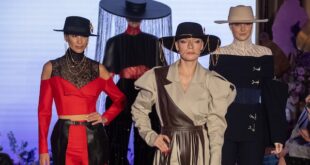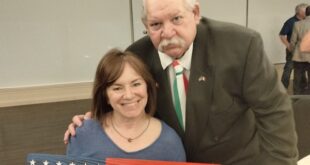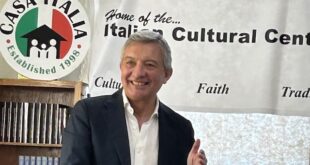Growing up in the dawn” of the variety show concept, one of my favorites had to be The Sonny & Cher Show. Each week, watching the little Italian guy get picked on by the tall beauty, well, really hit home for me for obvious reasons. When the show went on summer hiatus in 1974, its replacement starred a guy who I was excited to see, mainly because he was another Italian American with a great voice. Tony Orlando was actually Greek and Puerto Rican, but he still looked like one of my cousins with the big bushy moustache and ’70s disco hair parted down the middle.
He sang some of the biggest pop songs of the day. His classy backup singers were beautiful and sarcastic, and made the show even funnier. Telma Hopkins and Joyce Vincent Wilson were their names, and for two short seasons, the threesome known as “Tony Orlando and Dawn” became one of the most popular acts of the day. Their songs, “Tie a Yellow Ribbon ’Round the ‘Ole Oak Tree,” “Knock Three Times,” “Candida” and “He Don’t Love You” live on, being played somewhere around the world countless times every day.
After all these years, I finally got the chance to work with Tony Orlando during his recent appearance at my Arcada Theatre in St. Charles. I expected him to be nice as that was the reputation that preceded him. What I didn’t expect was someone who turned out to be one of the most genuine, generous and sincere individuals I have come to meet.
Upon my introduction, he immediately opened his arms for a hug, with a sincere “thank you” for bringing him in. He walked around and expressed his total admiration for the theater. As we sat down for our interview, he put his arm around me and looked into the camera, calling me a “man with passion” because “nobody does what you do and how you do it, and not have a deep passion for people and for the music” I was really taken aback by his sweetness!
I thanked him for what his anthem “Tie a Yellow Ribbon ’Round the ‘Ole Oak Tree” came to mean for those waiting for a loved one to return, particularly in the military. I told him about my late father, a WWII hero. We both teared up, and I kind of lost it on camera. He said, “Your father is with you here now, and he is quite proud.” Goodness, how was I supposed to continue?
Anyway, he talked about his storied career, being discovered by the legendary Don Kirshner, the same guy who put together The Monkees and featured countless artists on his television show, “Don Kirshner’s Rock Concert.” As a young New Yorker, Orlando had two hits with his doo-wop group “The Five Gents” when he was just 16 years old.
I asked him who his biggest influence was at the time, and he said, “Hands down, Bobby Darin. He took such a liking to me, he actually became my mentor. He spent over two hours with me as a budding 16-year-old singer, and gave me insight that I use to this day. He was the most talented man I have ever known. I can remember co-hosting a show with Sammy Davis, Jr. in Las Vegas. I asked Sammy, ‘Who would you NOT want to follow on stage?’ He quickly replied, ‘Bobby Darin. He could sing rock, he could sing soul, he could sing the blues, he could sing Sinatra, he could dance, he could do it all,’ Sammy said.”
Bobby Darin died of heart disease at 37 years old. Tony recalled the time as if it happened yesterday. “We became like brothers. As he got sicker and sicker, and he knew the end was near, Bobby ultimately bequeathed his rhythm section to me. His musical director, Bob “Rosie” Rozario (the guy I would be referring to on the TV show when I would say ‘Hit it, Rosie’) and I were driving to a rehearsal one day and Bobby saw us on the road and pulled us over. He looked into the car and told Rosie, ‘This kid is going to be big. His song “Tie a Yellow Ribbon ’Round the ‘Ole Oak Tree” is going to be HIS ‘Mack The Knife.’ I want you and the guys to be his band, and you be his musical director.”
“I remember we were all n stage when we got the word that Bobby had died. At first, we were all so down, just so upset. But then I felt strengthened. I felt he was on stage with me, and he made sure that I was going to be all right by giving me his band. Yes, he has been with me ever since.”
The stories kept pouring out. I asked about his Chicago connection, since he recorded a Jerry Butler tune and the Chicago garage-rock band “The New Colony Six” recorded one of his songs. But his big Chicago presence came as a result of the support of another Chi-town legend, radio personality Dick Biondi.
“There were three radio guys who really helped my career. Alan Freed, the guy who coined the phrase Rock ’n’ Roll; Cousin Brucie in New York; and Dick Biondi in Chicago. He would be the only guy to welcome me at the airport and he would send me pizzas to the performances. He is a true-blue guy, a gem of a man,” Tony said.
He then took me aside and noticed the throngs of yellow ribbons tied around trees in St. Charles. “That wasn’t just for me, was it?” I told him that in conjunction with his appearance at The Arcada, the community tied yellow ribbons around the city in response to a missing young teenaged girl who had disappeared a few days before. He asked me to get him one of those ribbons. He wrote on it, “Come home Emily, this ribbon is to welcome you back home. God Bless You, Tony Orlando.”
He wrote this while she was still missing. The next day, she was found, safe and sound. Just another example of the power of positive thinking, the power of hope. Tony Orlando is a great American, a wholesome performer and the personification of how a simple yellow ribbon can make the difference between sadness, and the happiest day of one’s life.
As he finished his incredible show to a thunderous standing ovation, he walked toward me to leave the stage. He gave me a sweaty and warm hug and whispered in my ear, “Tonight was for your dad.” His music touched the crowd, his warmth touched my heart and he as a man deserves a 21-gun salute. This is one guy that won’t have to “knock three times” to get into the Pearly Gates.
For more, visit www.oshows.com.
 Fra Noi Embrace Your Inner Italian
Fra Noi Embrace Your Inner Italian


